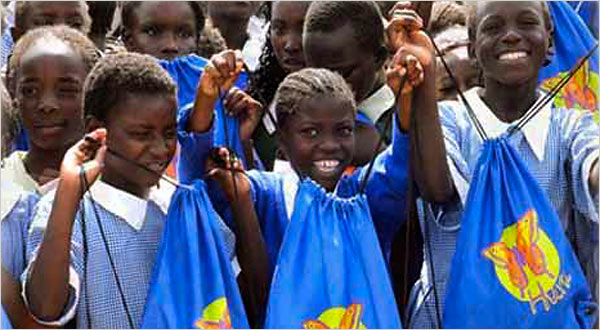Specifically, we’ve questioned the assumption that menstrual FLOW management is girls’ biggest menstrual problem (it is not, says at least one recent study–cramps are!). And we’ve been MORE critical of so-called altruistic solutions that are, underneath the (silent?) disposable wrapper, little-more than consumer socialization. Menstrual shame, sexism and poverty are not ameliorated though the cultivation of brand loyalty. Girls need information, support and the tools to develop awareness of their bodies while learning to live sustainably–this does not come in the shape of a box of single-use products that ends up clogging landfills.
Making green products available to girls while supporting economic growth and self-sufficiency in the Global South seems a more enduring and girl-centered initiative and there are number of projects that are doing just that. There Elizabeth Scharpf’s SHE initaitive in Rwanda and Lunapads donation program in collaboration with a number of related initiatives:
- Sexual Rights Centre (Zimbabwe)
- Lugari Community Resource Centre (Kenya)
- Kibaale Community School (Uganda)
- Imagine1Day (Ethiopia)
- Pads for Prisons Project (Sudan)
- Rafiki Africa (Kenya)
Yesterday, the NYTimes reported on a new study of Ghanian girls that found: ” Many schoolgirls from poor families stay home up to five days each month when they have their period.” (but could cramps be the culprit as they were in the study released in December 2009?)
The same piece described another cloth- pads- for- girls outreach effort, this one organized by a group called Huru International and supported by this eclectic list of backers: President’s Emergency Plan for AIDS Relief, the Elton John AIDS Foundation, Johnson & Johnson, Sunflag Steel, Warner Brothers. Huru International developed washable cloth pads and packaged them together with a few pairs of panties, laundry soap and HIV/AIDS info into kits for school girls in Kenya. Cloth pads–though admittedly not every menstruator’s preferred menstrual care option, does make sense especially for girls who lack the resources to buy single use products (one Kenyan girls reports that a box of pads costs is equivalent to the cost of a bag of corn flour).
It seems that the good ole’ time-tested cloth pad is emerging as a viable option for girls throughout Africa.
We think that’s encouraging news, for the planet AND for girls.

 We at re: Cycling have been tracking the African-girls-miss-school-because-they-menstruate equation for a while now.
We at re: Cycling have been tracking the African-girls-miss-school-because-they-menstruate equation for a while now.
I’m sorry, am I to understand this is supposed to be an “Unnecessary Invention”??? This is a VERY necessary product in Africa apparently, as these girls have no way to buy disposible products and also miss up to 5 days of school per month because of their cycle (and lack of anything to manage it with). I think it’s fantastic that someone is donating cloth pads and how can we get more people aware of this need and where can we donate???
But isn’t it true that girls is some parts of Africa may lack access to clean water needed to wash the pads?
Thanks for reading and posting! I think pad programs are valuable indeed and much preferable
to corporate distribution of single use products. I have heard of concerns about water for
washing the pads out, however. I have not looked into this myself (at the same time, there are
concerns about adequate disposal facilities for single use products). My point in the post was
to applaud the pad programs but also call attention to the conflicting data on what is REALLY a
at the root of girls missing school because of menstruation (one study found CRAMPS not flow
management were keeping girls home). In our menstruation=hygenic crisis (that equation develop-
ed by Joan Jacobs Brumberg, a historian) mindset, it is tempting to think that if we’ve got
the clean-it-up-tidy-it-away dimension of menstruation handled, that’s good enough. But we have to think about more how girls and women EXPERIENCE all aspects of their cycles–and not only at
the physical level, but at the emotional one, too.
Hi, Dusty – thanks for reading and commenting. The headline “Unnecessary Invention” is for the previous post, about a device that purports to reduce the duration of menstrual flow. We agree that cloth pads ARE necessary and valuable, for girls in Africa and everywhere else!
As for making a donation, I suggest contacting SHE or Lunapads; both organizations are doing this kind of work.